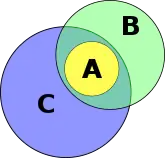Association fallacy
The Association Fallacy, also known as Guilt by Association, is an informal fallacy that is committed when a person, belief or group is attacked or defended on the basis that it has something in common with a positively or negatively viewed person, belief or group. It is, to an extent, a form of non sequitur.

| Cogito ergo sum Logic and rhetoric |
| Key articles |
| General logic |
| Bad logic |
|
v - t - e |
“”Hitler wrote a book! |
| —Protest sign against books, Postal 2 |
In other words: the speaker assumes that since two things share one thing in common, they must share everything in common, including the things they are (in)famous for.
Alternate names
- ex concessis
- bad company fallacy
- company that you keep
- guilt by association
- honor by association
- group fallacy
- social identification
Forms

This form is used when arguing for the guilt/virtue of a large group of people.
- P1: A is part of group B.
- P2: A is also part of group C.
- C: Therefore, all members of group B are part of group C.
Meanwhile, this form is used when arguing for the guilt/virtue of a specific person. Here, the idea that all members of group B are members of group C is implied, rather than explicitly stated.
- P1: A is part of group B.
- P2: A is part of group C.
- P3: D is also part of group B.
C: Therefore, D is part of group C.
Positive uses
Using this fallacy in a positive context is called Honor by Association.
Examples:
- P1: Martin Luther King was a Baptist.
- P2: King was a good person.
- C: Therefore, Baptists are good.
In this case, the fallacy implies that the good things that people associate with Martin Luther King came from him being a Baptist. While this may, in part, be true, it is fallacious to state that all Baptists will be good, or that someone becoming a Baptist will become good. In politics, the association fallacy is often subtly combined a priori reasoning in a manner that is clearly nonsensical when spelled out:
- P1: The Republican Party is opposed to raising the minimum wage.
- P2: Abraham Lincoln was a member of the Republican Party.
- P3: Abraham Lincoln was a good man.
C: Therefore, we should not raise the minimum wage.
Although it might well be true that Abraham Lincoln was a good man, this does not reflect on the Republican Party's political ideas today, and it also misses the historical context. More importantly, such arguments take as a premise that the Republican Party ought to oppose the minimum wage and then seek to rationalize it, rather than concluding the minimum wage ought not to be raised based on empirical evidence.
Negative uses
Using this fallacy in a negative context is called Guilt by Association.
Examples:
- P1: Stalin was an atheist.
- P2: Stalin had millions of people killed.
- C: Therefore, atheists are awful people.
Another classic example is the thought process used by some in the anti-nuclear movement:
- P1: Nuclear weapons, which can destroy civilization, utilize energy from fission.
- P2: Nuclear power utilizes energy from fission.
- C: Therefore, nuclear power is bad.
Negating the positive use above:
- P1: Fred Phelps was a Baptist.
- P2: Fred Phelps was intolerant.
- C: Therefore, Baptists are intolerant.
Guilt by association typically relies on fear and pre-existing stereotypes. In the former case, many of the acts that Stalin committed are inherently fearful, but it's doubtful whether he ordered them on account of his atheism[note 1] or in the name of communism. Even if this doubt wasn't present, to attribute the negative aspects of Stalin to these beliefs is fallacious as the beliefs themselves say nothing about mass murder. This is similar to how, in a post 9/11 world especially, moderate Muslims have been faced with unfortunate associations due to the acts of fundamentalists and Jihadists. In the latter case, the fear of nuclear weapons inspired by Cold War propaganda is used to suggest that nuclear power should be similarly feared on the basis that it uses the same physical process, even though the process of fission itself is morally neutral.
An example of conspiracy theorists demonizing (no pun intended) a debunker[2]:
Examples from the fringe
Molyneux's version
“”Determinists say humans are exactly like computers [in causation] but they only ever debate people. |
| —Stefan Molyneux on the Joe Rogan Experience. |
Stefan Molyneux's argument against determinism goes as follows:
- P1: Determinists say humans are identical to rocks in causation.
- P2: Determinists debate people.
- C: They're doing the same thing as debating rocks.
Molyneux elaborates on this by using the analogy that if a group of oranges is identical, "it wouldn't matter which one I eat"; without realizing the irony that according to his logic, oranges are identical to computers because of deterministic causation so he should eat computers.
Galileo Gambit
Cranks often say, "But Galileo was persecuted in his day, and he was right!" when their ideas come under attack.
This follows the form:
- P1: Galileo was persecuted for his beliefs.
- P2: Galileo was right.
- P3: I'm persecuted for my beliefs.
C: I'm right.
This is not even wrong — Galileo was persecuted not because people disagreed, but because if he was right it would have contradicted the dominant Christian worldview of the time.
Baiting
The construction "x-baiting," where x is an undesirable ideology or group of people, is often used when a speaker attempts to make an association (real or imagined) between a person or group and x. Examples include:
- Green-baiting, associating all environmentalists with ecoterrorists.
- Race-baiting, making racially divisive comments or associating a person of a certain race with some wingnut (e.g. associating African Americans with Louis Farrakhan).
- Red-baiting, connecting a person to some (usually imaginary) communist plot or associating them with communism in some way.
- Terrorism-baiting, making spurious accusations of the subject's relation to a terrorist organization.
- Greece-baiting, connecting one's fiscal situation to that of Greece.
- Pink-baiting, linking everything bad to homosexuals and homosexuality.
- Hitler-baiting, connecting anything interpreted as bad to Nazism. See Godwin's Law.
See also
- Ad hominem
- Godwin's Law
- Poisoning the well
- Shill gambit
External links
- See the Wikipedia article on Association fallacy.
- Guilt by Association, Fallacy Files
- Ex Concessis, Bruce Thompson
- The Group Fallacy, the Mead Project
- Guilt by Association, Internet Encyclopedia of Philosophy
- Guilt by Association, Nizkor Project
- Using Logic in Composition, Papyr.com